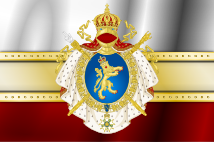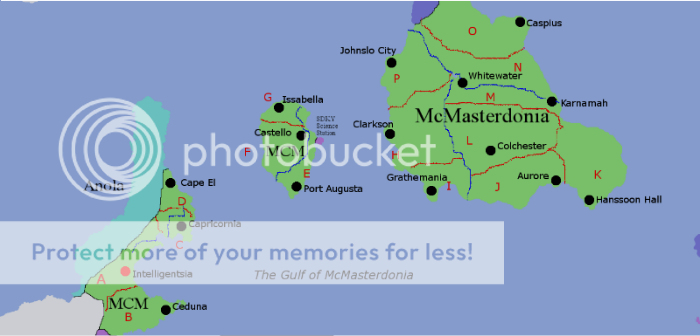Government
The Government of McMasterdonia is a complex arrangement based on historical ties, family relations and cultural expectations. Nations, Corporations, and individuals who wish to do business in McMasterdonia, or with McMasterdonia, will need to have some knowledge about these important factors.
King-Regent Albert in a statement to the nation said recently that "Any nation that does not understand the deep wounds of war and the deep cultural and family matters that have created this war that date back to ancient times is not entitled to comment on our affairs."
The Monarchy
The Monarchy has traditionally held very extensive political power and influence in the country, though more recently there have been some attempts to change this.
King-Regent Albert, The Current King of McMasterdonia
The King-Regent is the current head of state and will serve in this role until Prince Richard, the only son of Queen Matilda II achieves majority. The monarchy is hereditary and is passed to the next monarch via majority vote of the ruling house of McMasterdonia. In McMasterdonian history it has been considered standard practice for the throne to pass to the siblings of the sitting monarch before passing to the next generation. This is because of the strong cultural significance placed upon the relationship between siblings and the right to inheritance has traditionally accepted this as the norm.
The current King-Regent ascended to the throne upon the assassination of his sister, Queen Matilda II, along with her husband, multiple Ministers, her security team, and members of the press core, in the Republic of Eumenor. This assassination created significant problems for the bilateral relationship and for the Democratic Union.
One of the most famous McMasterdonian Monarchs, King Louis XIV who is widely credited with moving the Kingdom into the modern world exemplifies what many consider to be the characteristics of the McMasterdonian monarchs. They have traditionally been considered strong, demanding, and at times stubborn.
The late Queen Matilda II said of her father that;"My father was a hard man to please. Stubborn. Demanding. But only a hard, stubborn, demanding man could have healed the deep wounds inflicted by generations of civil strife and forged a lasting peace. Only a hard, stubborn, demanding man could have summoned the strength to unite this great nation and lead it into the community of nations. I intend to continue his work and to lead our nation to even greater heights in the years ahead."
The Legislature
The Legislative Arm of the McMasterdonian Government is primarily invested in the
Senate which is headed by the Chancellor. The Senate is made up of 150 seats elected with full-preferential instant-runoff voting in single-member seats. Voting is compulsory in the Kingdom of McMasterdonia. The Senate elects a Speaker by a 2/3rds majority vote, to serve as the Senate Spokesperson and to preside over standing orders and maintain civility in the chamber.
The Council of State, or the Upper House comprises of nobles and members of the Royal Family. The Council of State is primarily an advisory house, however it retains the right to block Senate legislation, although this is rare. The Council of State is a highly respected institution, given it's ties to the Church, provincial government and landed estates across the country. Senate Chancellors have ignored the advise of the Council of State to their own peril, on only two occasions. Chancellor Frederick refused to accept Council advise on State finances in 1925, wide spread protests gripped the country and Frederick's commission was terminated by King Wilhelm III. Chancellor Amelia Radford, faced similar protests when her administration attempted to abolish the Council of State, when a feud between herself and King Louis XIV erupted into the public domain in December 1973, ultimately resulting in her assassination by religious fanatic Isiah Embrulieo, January 3 1975.
Ever since the unfortunate assassination of Chancellor Radford, the position of Chancellor has been held by a member of the Royal Family or aristocracy. In 1981, the position was formerly transferred from the Senate to the Council of State. In recent times, Queen Matilda faced some political controversy when she continued this practice when she came to the throne of McMasterdonia in late 2013.
In mid-2013, the Senate was officially prorogued for an period to deal with the rebel insurgency problem in the nation. The Queen faced widespread criticism from international media and from other nations when elections continued to be suspended, and influential members such as the Countess of Castello was executed. Former House Speaker Elizabeth Hanssoon, of Hansoon Hall was also executed later that same year for committing lese majeste.
In 2015, following the ascension of King-Regent Albert to the throne of McMasterdonia, the Senate reconvened and attempted to pass multiple acts and appoint the terrorist Rosemary Whent as Senate Chancellor. This attempt was foiled by the quick response of the King and his elite personal bodyguard unit led by his long time confidant Sharifa.
At this time, the Senate is still prorogued indefinitely and elections are still on hold while the King's Government battles the insurgency and deals with the fall out from Queen Matilda II's assassination.
The Judicature
The Court of McMasterdonia is
de jure the lower court of the Kingdom of McMasterdonia. The Court is presided over by a Chief Justice who is appointed directly by the monarch of the day. The Chief Justice administers the rules of the Court and is responsible for the overseeing of administrative matters. The Monarch appoints additional Justices as provided by law, however these Justices are created as equals to the Chief Justice, with the Chief Justice only retaining additional authority on administrative matters and as the legal counsel to the monarch of the day. In practice, the Court of McMasterdonia is the only court to oversee criminal or civil matters, with no appeal on either of those matters proceeding to the Senate since 1915.
Parties to a case may appeal a decision reached by the Court of McMasterdonia to an extraordinary hearing of the Senate, presided over by the monarch of the day or their designee. This often occurs on matters of constitutional significance or ambiguity. The last extraordinary Senate session was held in the late 1990's over ambiguity of the rights of citizens.








